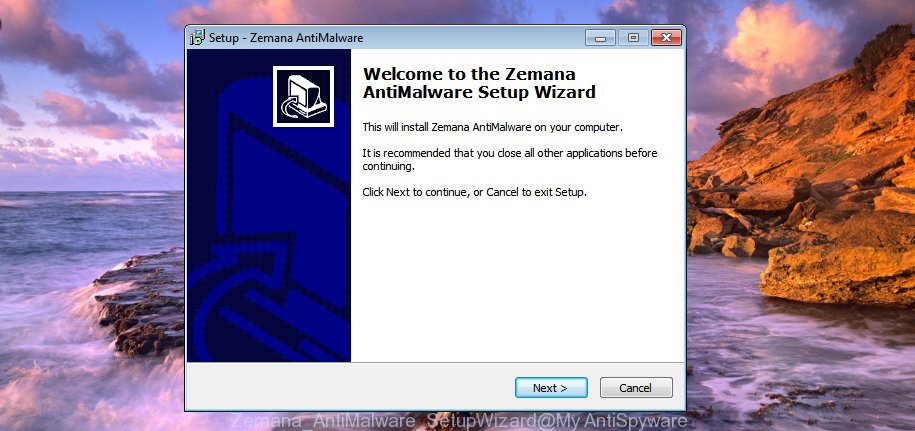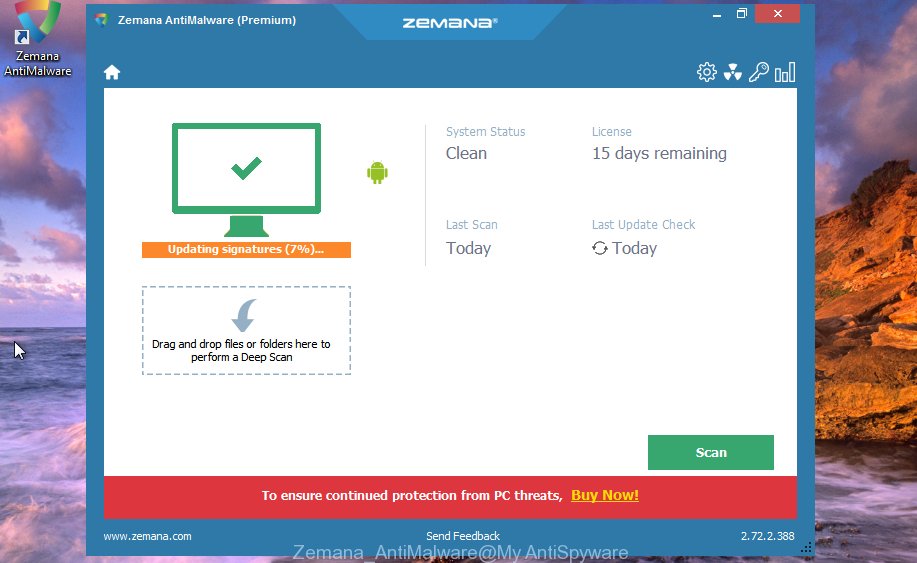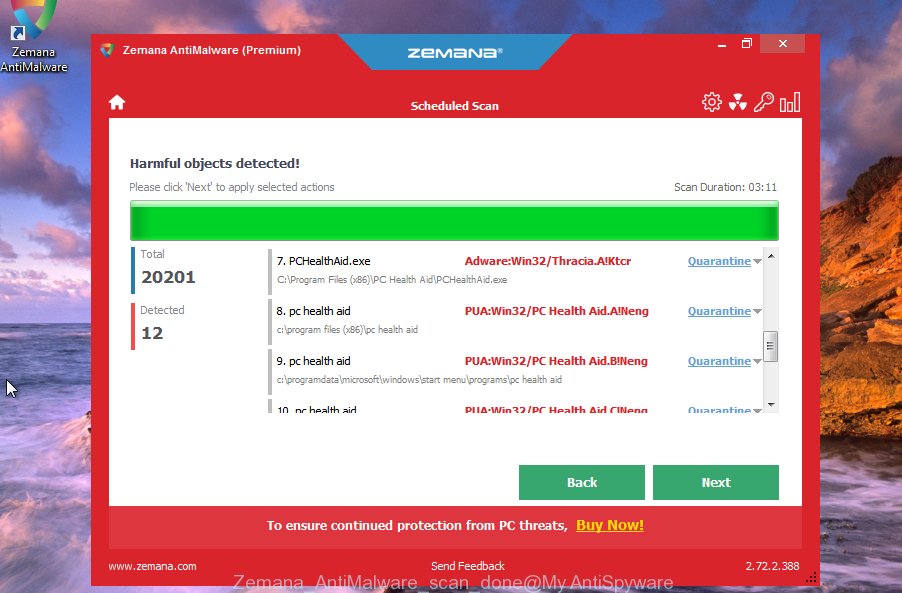What is Cortana – It Seems Your PC Is Locked Out SCAM?
Cortana – It Seems Your PC Is Locked Out scam is a technical support scam that is promoted by untrustworthy websites. Typically, such scams claim that users’ computers are infected with viruses, Trojans, or spyware and suggest that they immediately call “technical support” at the listed phone numbers.
Technical support scams are often disguised as “security warnings” from antivirus software or operating system. In this particular case, the Cortana – It Seems Your PC Is Locked Out SCAM pretends to be a notification from Microsoft Windows Defender. Technical support scams are designed to abuse users’ trust. Scammers trick users into buying unnecessary software, paying for ‘technical support’, and so on. It must be emphasized that this scam is in no way associated with Microsoft or its products.
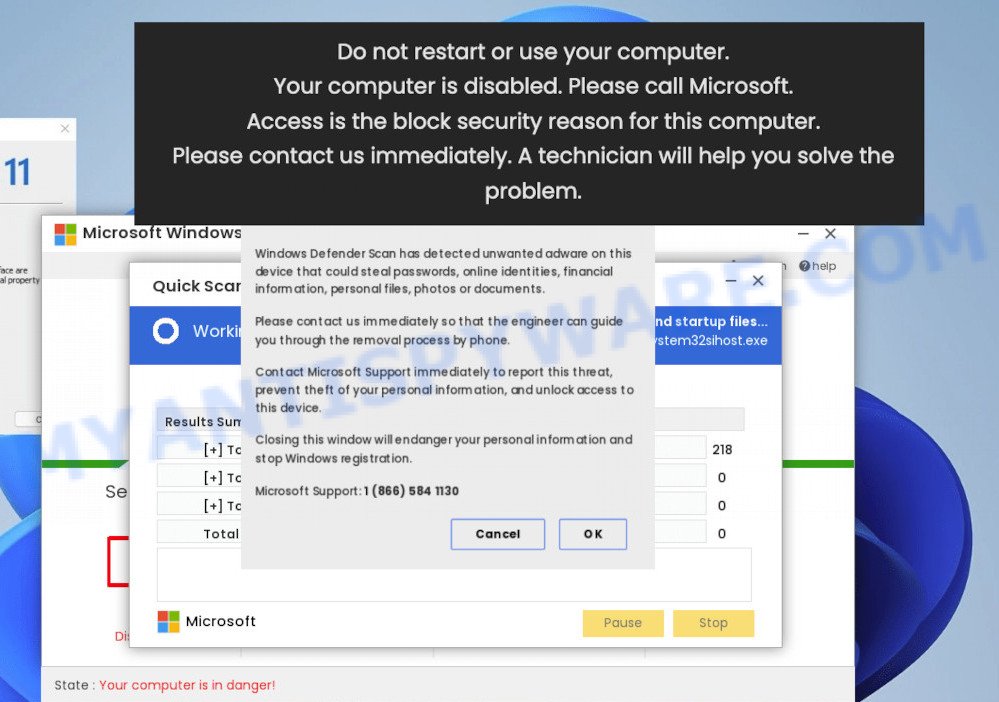
Cortana – It Seems Your PC Is Locked Out SCAM
QUICK LINKS
When users accessed a website that served the “Cortana – It Seems Your PC Is Locked Out POP-UP” scam, they are shown several pop-ups: a fake alert pretending to be an official alert from Microsoft Windows Defender, some threats alerts and a chat window. The chat window says that Cortana (Microsoft’s chatbot) wants to help, but due to a critical failure, chat support is unavailable. Instead, the scam strongly recommends calling the support number provided.
Text presented on the Cortana – It Seems Your PC Is Locked Out scam:
Hello!
How is your day going?
Hi! I’m Cortana, a new AI chatbot by Microsoft. It seems your PC is locked out due to security reasons.
Click on one of these options to continue troubleshooting.
Self Diagnostic Tool
Run Complete ScanUnfortunately, chat support is not available for this critical failure. Please contact Support
Once called, the scammers, posing as representatives from Microsoft, offer fake solutions for the non-existent “security problems” and ask for payment in the form of a one-time fee or subscription. Scammers can also recommend installing a remote control tool, which they pretend to be a program to diagnose a computer. It is important to understand that having access to a computer, scammers can steal private information and personal files, install malware (spyware, ransomware or Trojan horses) and make fraudulent purchases.
Usually the “Cortana – It Seems Your PC Is Locked Out” pop-ups are is caused by Adware, pop-ups, push notifications, followed by software downloads and redirects.
Browser (push) notifications are originally developed to alert the user of recently published news. Cyber criminals abuse ‘push notifications’ to avoid antivirus software and ad blocking tools by displaying unwanted advertisements. These ads are displayed in the lower right corner of the screen urges users to play online games, visit scam pages, install web browser add-ons & so on.
Adware is a form of malicious that displays unwanted advertisements on the internet browser. Some of these ads are scams or fake advertisements created to trick users. Even the harmless advertisements can become really irritating. Adware can be installed unintentionally and without users knowing about it, when they open email attachments, install free programs.
How does Adware get on your personal computer
Most of unwanted advertisements and scam pop-ups come from web-browser toolbars and/or extensions, BHOs (browser helper objects) and suspicious programs. In many cases, these items claim itself as software which improve your experience on the Internet by providing a fast and interactive startpage or a search provider that does not track you. Remember, how to avoid the unwanted applications. Be cautious, start only reputable apps which download from reputable sources. NEVER install any unknown and suspicious apps.
Threat Summary
| Name | Cortana – It Seems Your PC Is Locked Out |
| Type | technical support scam, phishing, fake alerts |
| Fake claims | computer is locked out due to security reasons |
| Symptoms |
|
| Removal | Cortana – It Seems Your PC Is Locked Out removal guide |
Windows Defender – Security Warning, McAfee Tollfree, Microsoft Windows Virus Alert, Your McAfee Subscription Has Expired are other “technical support” scams. There are many sites on the Internet that promote such scams. The “technical support scam” sites should never be trusted, they should be closed as soon as they appear on the screen.
How to protect against “Cortana – It Seems Your PC Is Locked Out” scam
To avoid becoming a victim of scammers, it is important to always keep in mind:
- There are no sites that can detect security problems.
- Warning messages (errors) from Microsoft never include a phone number.
- Microsoft tech support will never ask you to pay for support with gift cards or cryptocurrency.
- Never install software promoted by scam sites, as it can be useless, and besides, it can be dangerous for you and your computer.
- Close “Cortana – It Seems Your PC Is Locked Out” as soon as it appears on your computer screen. Scammers can prevent you from closing it in various ways. In such cases, close your browser using Task Manager or restart your computer. If the next time you launch the browser, it prompts you to restore the previous session, abandon it, otherwise this scam will reopen on your screen.
- Use an ad blocker when browsing the internet. It can block known scam sites and protect you from scammers.
How to remove Cortana – It Seems Your PC Is Locked Out pop ups (Adware removal guide)
In order to get rid of Cortana – It Seems Your PC Is Locked Out scam, start by closing any applications and pop ups that are open. If a pop up won’t close, then close your browser (Chrome, Firefox, Internet Explorer and Edge). If a program won’t close then please restart your computer. Next, follow the steps below.
To remove Cortana – It Seems Your PC Is Locked Out, complete the following steps:
- Remove recently added software
- Reset Internet Explorer
- Reset Firefox
- Reset Google Chrome
- Automatic Removal of Cortana – It Seems Your PC Is Locked Out scam
- Stop Cortana – It Seems Your PC Is Locked Out pop up scam
How to remove Cortana – It Seems Your PC Is Locked Out pop-ups without any software
The step-by-step instructions designed by our team will allow you manually remove the “Cortana – It Seems Your PC Is Locked Out” scam from your computer. If you have little experience in using computers, we advise that you use the free adware removal tools listed below.
Remove recently added software
The main cause of the Cortana – It Seems Your PC Is Locked Out pop-ups could be PUPs, adware and browser hijackers that you may have accidentally installed on the computer. You need to find and uninstall any suspicious software.
|
|
|
|
Reset Internet Explorer
By resetting Microsoft Internet Explorer web-browser you restore your web-browser settings to its default state. This is basic when troubleshooting problems that might have been caused by adware that causes Cortana – It Seems Your PC Is Locked Out popups in your web-browser.
First, launch the Internet Explorer, then press ‘gear’ icon ![]() . It will display the Tools drop-down menu on the right part of the web-browser, then click the “Internet Options” as displayed on the screen below.
. It will display the Tools drop-down menu on the right part of the web-browser, then click the “Internet Options” as displayed on the screen below.

In the “Internet Options” screen, select the “Advanced” tab, then press the “Reset” button. The Internet Explorer will display the “Reset Internet Explorer settings” dialog box. Further, click the “Delete personal settings” check box to select it. Next, click the “Reset” button as displayed in the figure below.

After the task is finished, click “Close” button. Close the Microsoft Internet Explorer and reboot your PC for the changes to take effect. This step will help you to restore your internet browser’s startpage, default search provider and newtab to default state.
Reset Firefox
If the Mozilla Firefox web browser is redirected to the Cortana – It Seems Your PC Is Locked Out scam and you want to restore the Mozilla Firefox settings back to their default state, then you should follow the few simple steps below. However, your saved bookmarks and passwords will not be lost. This will not affect your history, passwords, bookmarks, and other saved data.
Run the Firefox and click the menu button (it looks like three stacked lines) at the top right of the web-browser screen. Next, click the question-mark icon at the bottom of the drop-down menu. It will show the slide-out menu.
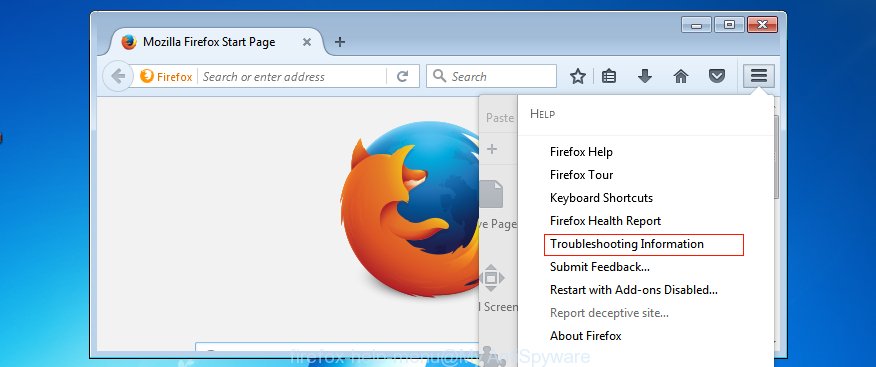
Select the “Troubleshooting information”. If you are unable to access the Help menu, then type “about:support” in your address bar and press Enter. It bring up the “Troubleshooting Information” page as shown in the figure below.
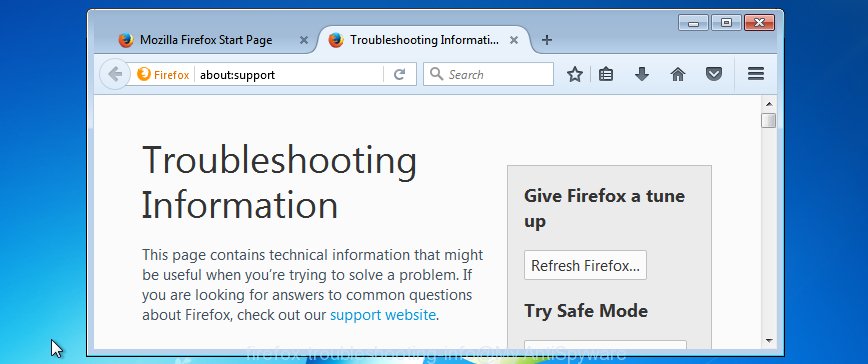
Click the “Refresh Firefox” button at the top right of the Troubleshooting Information page. Select “Refresh Firefox” in the confirmation prompt. The Mozilla Firefox will begin a process to fix your problems that caused by the adware. When, it’s complete, press the “Finish” button.
Reset Google Chrome
Run the Reset web browser tool of the Google Chrome to reset its settings such as homepage, default search engine and new tab to original defaults. This is a very useful utility to use, in the case of browser redirects to scam sites such as Cortana – It Seems Your PC Is Locked Out.
First open the Google Chrome. Next, click the button in the form of three horizontal dots (![]() ).
).
It will display the Chrome menu. Choose More Tools, then click Extensions. Carefully browse through the list of installed extensions. If the list has the extension signed with “Installed by enterprise policy” or “Installed by your administrator”, then complete the following steps: Remove Google Chrome extensions installed by enterprise policy.
Open the Google Chrome menu once again. Further, click the option named “Settings”.
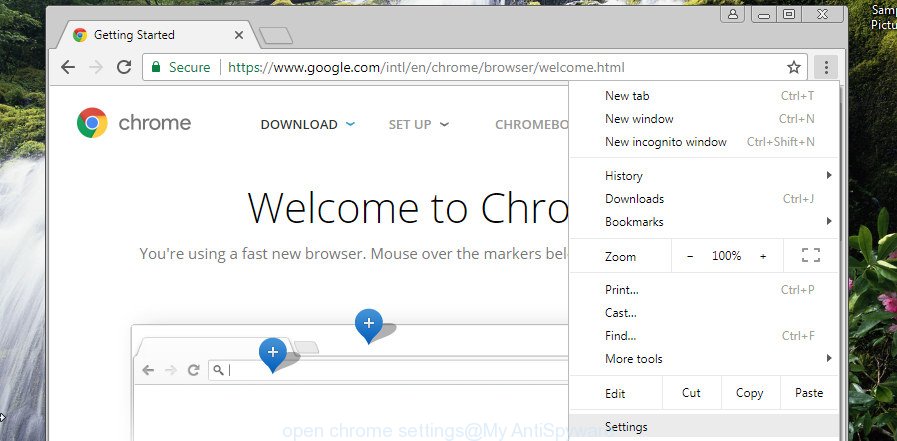
The web browser will show the settings screen. Another method to open the Google Chrome’s settings – type chrome://settings in the internet browser adress bar and press Enter
Scroll down to the bottom of the page and press the “Advanced” link. Now scroll down until the “Reset” section is visible, as shown on the screen below and press the “Reset settings to their original defaults” button.
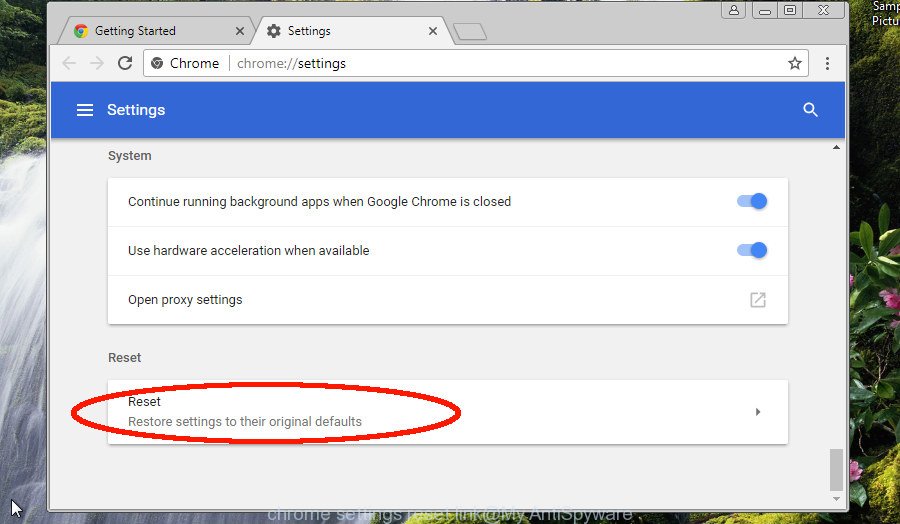
The Google Chrome will display the confirmation prompt as on the image below.

You need to confirm your action, click the “Reset” button. The browser will run the procedure of cleaning. Once it’s finished, the web-browser’s settings including search provider, new tab page and homepage back to the values that have been when Chrome was first installed on your computer.
Automatic Removal of Cortana – It Seems Your PC Is Locked Out scam
Malware removal utilities are pretty effective when you think your computer is infected by adware software. Below we will discover best utilities that can be used to remove adware and get rid of the Cortana – It Seems Your PC Is Locked Out pop-ups from your PC and web-browser.
How to get rid of Cortana – It Seems Your PC Is Locked Out scam with Zemana Anti-Malware
Thinking about remove “Cortana – It Seems Your PC Is Locked Out” popups from your web browser? Then pay attention to Zemana AntiMalware. This is a well-known utility, originally created just to look for and get rid of malware, adware software and PUPs. But by now it has seriously changed and can not only rid you of malicious software, but also protect your PC from malware and adware, as well as identify and remove common viruses and trojans.
- Zemana AntiMalware can be downloaded from the following link. Save it directly to your MS Windows Desktop.
Zemana AntiMalware
165044 downloads
Author: Zemana Ltd
Category: Security tools
Update: July 16, 2019
- Once you have downloaded the setup file, make sure to double click on the Zemana.AntiMalware.Setup. This would start the Zemana install on your personal computer.
- Select installation language and click ‘OK’ button.
- On the next screen ‘Setup Wizard’ simply click the ‘Next’ button and follow the prompts.

- Finally, once the setup is complete, Zemana will run automatically. Else, if doesn’t then double-click on the Zemana Anti-Malware icon on your desktop.
- Now that you have successfully install Zemana, let’s see How to use this malware removal tool to get rid of the Cortana – It Seems Your PC Is Locked Out popups from your computer.
- After you have started the Zemana, you will see a window as shown on the screen below, just press ‘Scan’ button to perform a system scan for the adware.

- Now pay attention to the screen while Zemana scans your computer.

- Once the checking is complete, you will be displayed the list of all found threats on your PC system. Next, you need to press ‘Next’ button.

- Zemana may require a restart computer in order to complete the Cortana – It Seems Your PC Is Locked Out scam removal process.
- If you want to permanently delete adware from your PC system, then click ‘Quarantine’ icon, select all malware, adware, PUPs and other threats and click Delete.
- Restart your PC to complete the adware removal procedure.
Remove Cortana – It Seems Your PC Is Locked Out pop up scam from web-browsers with Hitman Pro
Hitman Pro is a free utility that can search for adware that causes multiple unwanted popups. It’s not always easy to locate all the junk apps that your personal computer might have picked up on the Net. Hitman Pro will locate the adware, browser hijackers and other malicious software you need to delete.
Installing the Hitman Pro is simple. First you’ll need to download Hitman Pro on your PC from the following link.
When downloading is finished, open the file location and double-click the Hitman Pro icon. It will start the Hitman Pro utility. If the User Account Control prompt will ask you want to start the application, click Yes button to continue.
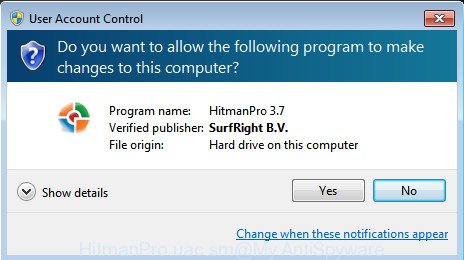
Next, click “Next” to perform a system scan with this utility for the adware that causes Cortana – It Seems Your PC Is Locked Out popups in your web-browser. A scan can take anywhere from 10 to 30 minutes, depending on the number of files on your PC system and the speed of your computer. When a threat is detected, the number of the security threats will change accordingly. Wait until the the checking is done.
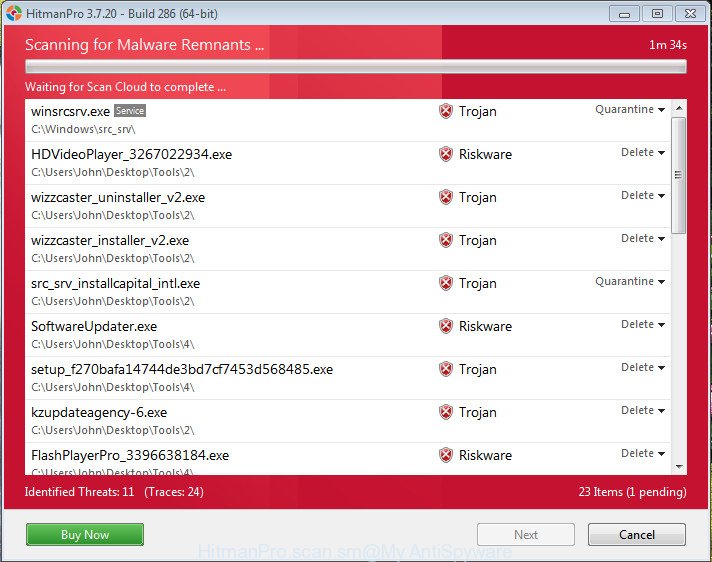
Once the system scan is done, you can check all items detected on your device as shown in the figure below.
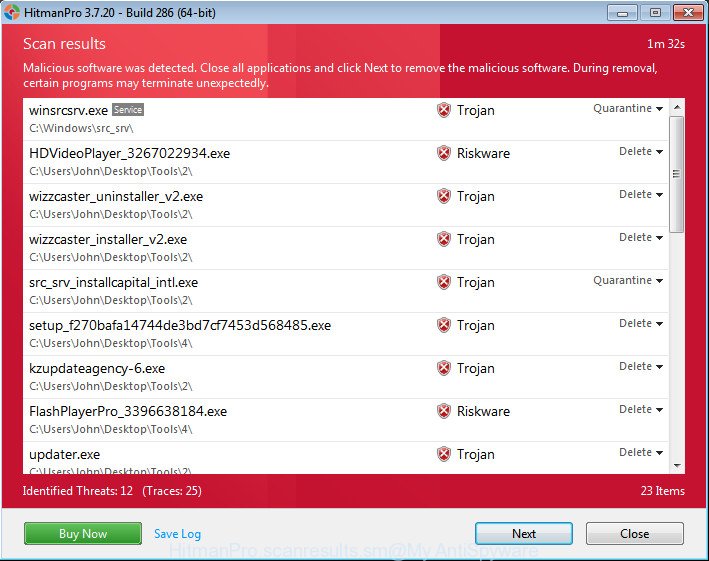
All detected items will be marked. You can remove them all by simply click “Next” button. It will show a dialog box, press the “Activate free license” button. The Hitman Pro will delete adware software responsible for Cortana – It Seems Your PC Is Locked Out popups. Once the cleaning procedure is complete, the utility may ask you to reboot your personal computer.
Use MalwareBytes to get rid of Cortana – It Seems Your PC Is Locked Out pop-ups
Manual adware removal requires some computer skills. Some files and registry entries that created by the adware may be not fully removed. We recommend that use the MalwareBytes Anti-Malware that are fully remove adware from your PC. Moreover, this free removal tool will allow you to get rid of malware, potentially unwanted programs, hijackers and toolbars that your computer can be infected too.
First, click the following link, then click the ‘Download’ button in order to download the latest version of MalwareBytes Anti-Malware.
327273 downloads
Author: Malwarebytes
Category: Security tools
Update: April 15, 2020
Once downloading is finished, close all programs and windows on your personal computer. Double-click the install file named MBSetup. If the “User Account Control” dialog box pops up as displayed on the image below, click the “Yes” button.
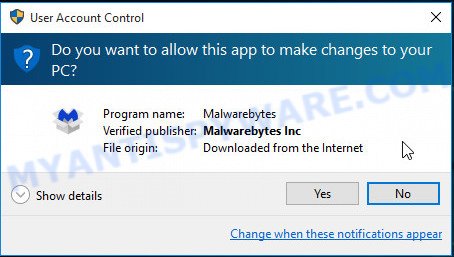
It will open the Setup wizard which will help you setup MalwareBytes Anti-Malware on your device. Follow the prompts and do not make any changes to default settings.
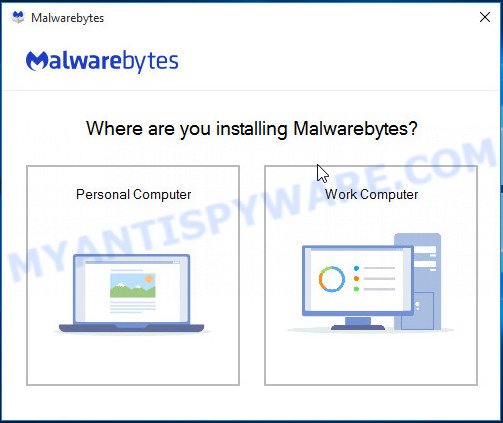
Once install is done successfully, click “Get Started” button. MalwareBytes AntiMalware will automatically start and you can see its main screen as shown on the image below.
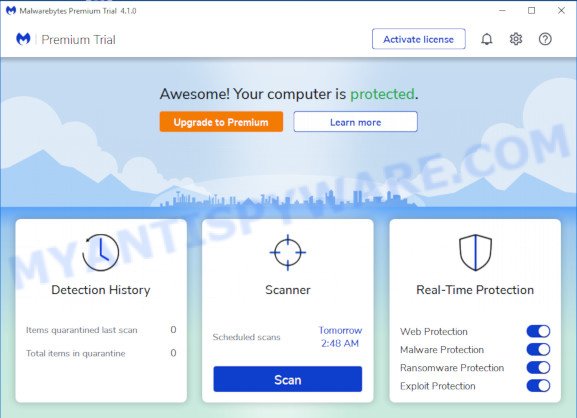
Now click the “Scan” button to search for adware responsible for the Cortana – It Seems Your PC Is Locked Out popups. This process can take quite a while, so please be patient. While the tool is checking, you can see count of objects and files has already scanned.
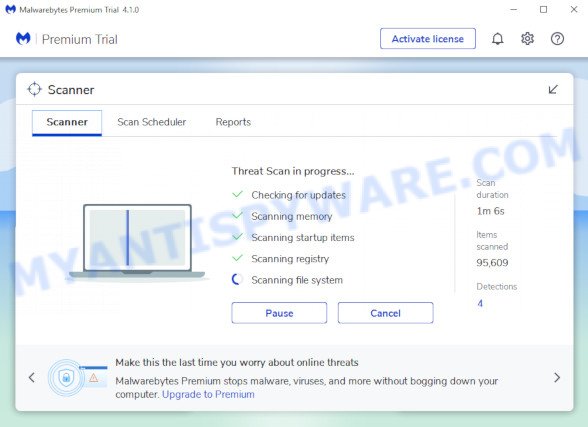
Once MalwareBytes Anti-Malware completes the scan, it will open the Scan Results. Make sure to check mark the items which are unsafe and then press “Quarantine” button. The MalwareBytes AntiMalware will remove adware related to the Cortana – It Seems Your PC Is Locked Out pop up scam and move the selected items to the program’s quarantine. After finished, you may be prompted to restart the computer.

We recommend you look at the following video, which completely explains the process of using the MalwareBytes Anti-Malware to remove adware, hijacker and other malicious software.
Stop Cortana – It Seems Your PC Is Locked Out pop up scam
Use an ad-blocking tool such as AdGuard in order to block unwanted advertisements, malvertisements, pop-ups and online trackers, avoid having to install malicious and adware browser plug-ins and add-ons which affect your computer performance and impact your device security. Browse the World Wide Web anonymously and stay safe online!
- Installing the AdGuard is simple. First you’ll need to download AdGuard from the link below.
Adguard download
26902 downloads
Version: 6.4
Author: © Adguard
Category: Security tools
Update: November 15, 2018
- Once the downloading process is finished, run the downloaded file. You will see the “Setup Wizard” program window. Follow the prompts.
- Once the installation is done, click “Skip” to close the installation program and use the default settings, or press “Get Started” to see an quick tutorial that will assist you get to know AdGuard better.
- In most cases, the default settings are enough and you don’t need to change anything. Each time, when you start your computer, AdGuard will run automatically and stop unwanted advertisements, block Cortana – It Seems Your PC Is Locked Out scam, as well as other harmful or misleading webpages. For an overview of all the features of the program, or to change its settings you can simply double-click on the icon called AdGuard, which is located on your desktop.
Finish words
Once you have removed the adware using the steps, Internet Explorer, Edge, Google Chrome and Mozilla Firefox will no longer redirect you to scam pages such as Cortana – It Seems Your PC Is Locked Out. Unfortunately, if the steps does not help you, then you have caught a new adware software, and then the best way – ask for help here.

